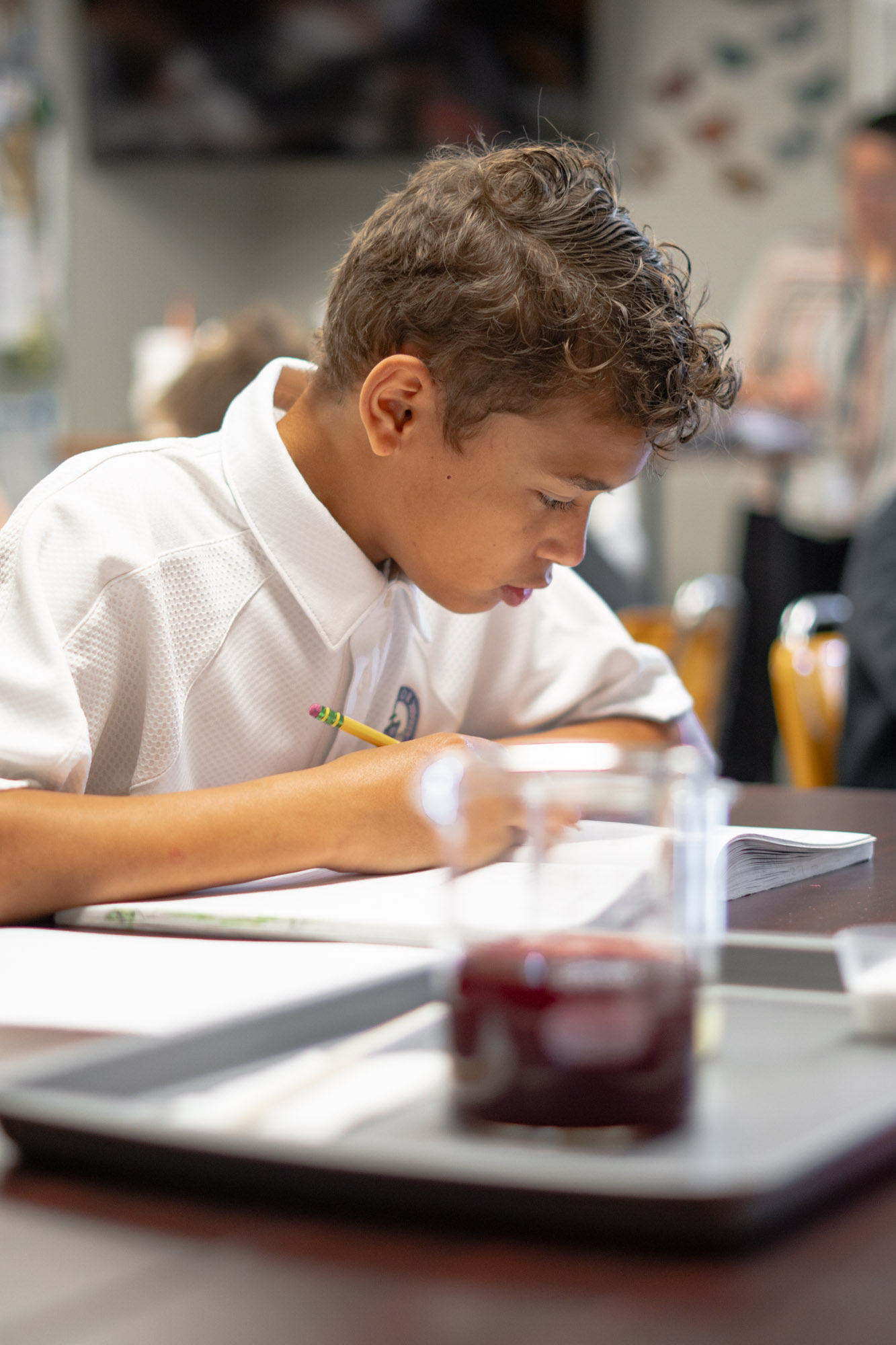School of Logic
Students in the logic stage of learning are inherently driven by curiosity, leading them to explore, inquire, and seek a more profound understanding of the world around them.
Curriculum

Fostering a passion for history, reading, and writing is a cornerstone of education at Valor. Through our comprehensive curriculum, students mature into skilled writers and enthusiastic readers, enabling them to tackle increasingly complex texts and classical literature. The dynamic structure of our Humanities block allows for an immersive exploration of historical epochs alongside the study of corresponding literary classics. Our educators focus on honing students’ communication skills through an intensive examination of the English language. This includes sentence diagramming, vocabulary enrichment, and paper editing. As students refine their communication abilities, they are better equipped to articulate their thoughts in speeches and engage in meaningful discussions. This educational approach empowers students to draw interdisciplinary connections, think autonomously, communicate with confidence, and cultivate a love for learning.
In our mathematics curriculum, the emphasis extends beyond mere proficiency in problem-solving to include a deep understanding of mathematical concepts. We aim to inspire students to engage rigorously and creatively with the subject. Mathematics is presented both as a valuable tool for comprehending the world and as a divine creation of intricate beauty. Our program ensures that your child will not only become adept at solving problems but will also develop a genuine appreciation for the subject. Students are thus equipped to appreciate the elegance and utility of mathematics while tackling both theoretical and real-world challenges.
The primary objective of our science curriculum is to explore how the intricacies of creation reflect the character of God. We find joy in the meticulous design, order, and creativity that pervade the natural world, all of which point us back to a magnificent Creator. Beyond this, the study of science cultivates intellectual virtues like curiosity, focus, and meticulousness—qualities that extend beyond the confines of the classroom. Students depart from our science courses invigorated by the awe-inspiring design of God’s creation and well-prepared for continued exploration and understanding of the natural world.
Clear communication stands as a central tenet of Valor’s educational philosophy across all subject areas. Our foreign language curriculum, particularly Latin, aligns with our mission to equip students to positively impact culture for God’s glory. Mastery of Latin serves as a gateway to understanding multiple languages, offering students foundational insights into the mechanics of language itself. Latin not only facilitates the learning of modern Romance languages but also enriches students’ grasp of English vocabulary and sentence structure. A significant portion of English’s polysyllabic words have Latin origins, and our Latin curriculum is carefully designed to enhance English vocabulary. At Valor, students are actively engaged in the grand discourse of Western Civilization and global culture, and a key component of this engagement is the enriching study of Latin.
The Bible curriculum for Valor’s School of Logic is designed to foster a foundational understanding of Scripture while deeply engaging students in discipleship. Aligned with our mission to ‘cultivate fervent disciples of Jesus,’ it is imperative that our students are well-versed in God’s Word and comprehend His overarching narrative of creation and redemption from Genesis to Revelation. To this end, the curriculum offers an in-depth study of the Old Testament in the 6th and 7th grades, and the New Testament in the 8th grade. Our aim is for students to grasp God’s ongoing work through comprehensive biblical study and to understand their role in this divine narrative through discipleship.
Parent Partnership
Class Trips
Humanities Reading List
- Book of Greek Myths
- Black Ships Before Troy
- The Wanderings of Odysseus
- Hittite Warrior
- Aeneas: Virgil’s Epic Retold for Younger Readers
- The Eagle of the Ninth
- The Golden Goblet
- Julius Caesar
- The Art of Poetry
- The Hobbit
- The Sword and the Circle
- Beowulf: Dragon Slayer
- Trumpeter of Krakow
- Eleanor of Aquitaine
- The Canterbury Tales retold
- A Midsummer Night’s Dream
- The Adventures of Robin Hood
- The Art of Poetry
- The Merchant of Venice
- The Prince and the Pauper
- selections from The Divine Comedy
- The King’s Fifth
- Henry V
- I, Juan de Pareja
- Stories from the Faerie Queene
- Faustus
- The Art of Poetry
Class Size and Schedule
Schedule
Monday/ Wednesday/ Friday, 8:30 a.m. to 3:30 p.m.
Tuesdays/ Thursday Home Days
Tuesdays/ Thursday Optional Study Hall, 8:30 a.m. to 11:30 a.m.
Class Size
Two sections of 16 students for each grade













